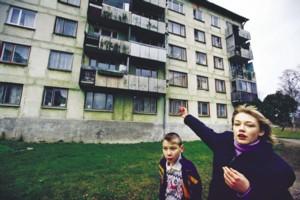Lilya 4 ever – more environmental determinism?

Like Anh Hung Tran’s 1995 film Cyclo, seen recently, Lilya 4 ever, a 2002 film directed by
Things get worse. Left alone in the none-too attractive ‘family’ flat, she’s soon visited by a none-too friendly aunt, who shoos her out to a more modest accommodation, a filthy decrepit bed-sit, presumably nearby. Lilya is still fantasizing about flight, but in the meantime she goes out on the town with her girlfriend Natasha (Elina Benenson), who has the idea of making money in good ole fashioned way. Lilya can’t go through with it but Natasha can, but when the money’s discovered, she puts the blame on her friend, who’s soon labeled a whore by the local likely lads.
Meanwhile, a younger street-kid, Volodya (Artyom Bogucharsky) starts hanging around, at first in the hope of sexual favours. Soon, though, a real bond develops between them, as he’s the only person in Lilya’s life who makes no demands – at least of the sort that need to be taken seriously.
So, estranged from her deceitful girlfriend, discouraged at school, hounded by the local lads (who end up raping her), Lilya has little alternative but to try prostitution in earnest. While she’s trawling for customers she encounters a tall handsome young character, who calls himself Andrei, played by Pavel Ponomaryov, who appears to take pity on her, but in fact his real purpose is to sell her into sex slavery in
On the bare bones of it, not a film to inspire confidence in human nature, and I wonder along with other critics about Moodysson’s claim that there’s a Christian redemptive theme running through it. However, it does capture well – in fact this is what lifts the film above the horror of its subject matter – how children, and indeed all of us, deal with extreme suffering. Trapped in Sweden, utterly friendless, completely isolated, sold to man after man, Lilya dreams of Volodya comforting her, his furry angel wings representing a kind of pure goodness and innocence. They play together on the roof of the abandoned building that they’d actually played on back in the USSR, and Volodya still has the basketball Lilya bought him from her first earnings as a prostitute (in fact the ball was soon punctured by Volodya’s violent father). Dreams of this kind come more frequently to Lilya as her life becomes increasingly grim. I don’t think there’s anything particularly Christian about them, but they do ring true. We naturally feel the harsh irony of Lilya creating an idyll of such pitiful material, but it’s the idea of the idyll that matters, a crystallisation of positive, warm feelings and memories, an intensification and exaggeration that enables her to transcend the abject reality of the present. It may well be that Moodysson was trying to suggest something more, especially as, in the final scene, when Lilya has jumped off the bridge and is being resuscitated by a medical team, we see a last dream sequence in which Lilya too has sprouted wings, but again I prefer to see this as an association of hope and happiness, an attempt at emotional escape and rescue.
A simple film about a real issue, (and the title refers to a decisive moment of self-belief in adversity which is in itself redemptive) Lilya 4 ever works painfully well, highlighting all too clearly the lack of choices available to so many people, especially children, in our most ravaged environments.
Labels: film


0 Comments:
Post a Comment
Subscribe to Post Comments [Atom]
<< Home